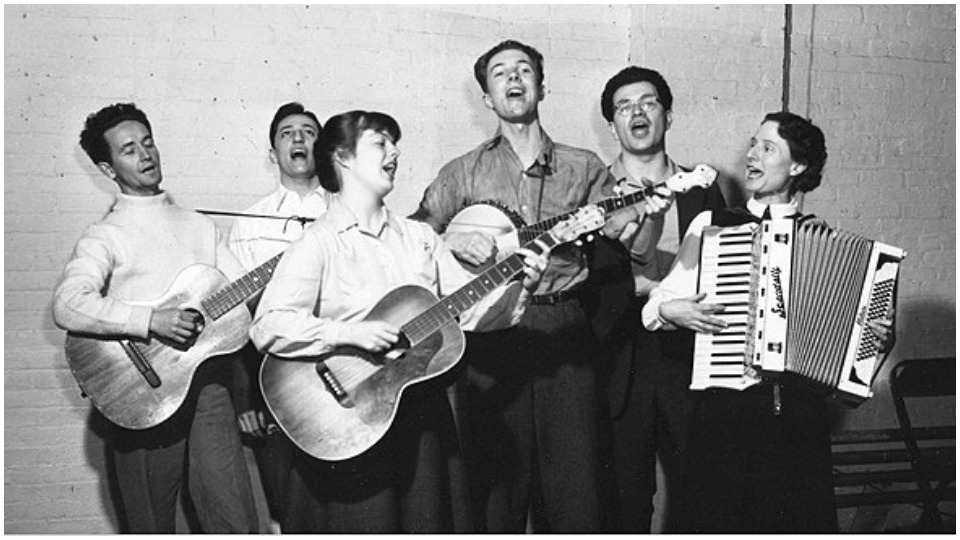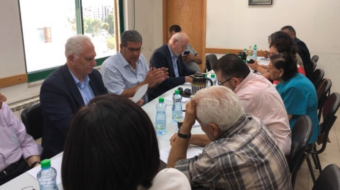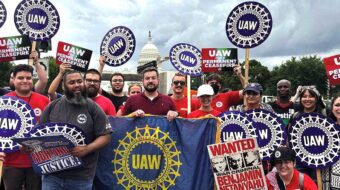
Musicians Pete Seeger, Woody Guthrie, and Agnes “Sis” Cunningham, among others, helped to mold and shape generations of music lovers. In many ways, their impact on the folk and popular music genre cannot be overstated.
However, Seeger, Guthrie, and Cunningham weren’t just musicians. They were political radicals. And their political, satirical, and witty working-class music and lyrics provided food for thought for millions of activists throughout the 20th century.
They were partisan. They chose sides. Their politics were well known, including to the Federal Bureau of Investigation (FBI). At different times, and in their own ways, Seeger, Guthrie, and Cunningham—as well as many other folk musicians—associated themselves with the Communist Party USA (CPUSA).

Some, such as Seeger, would continue a relationship with the CPUSA and individual Communists well into the 2000s. Others, such as Oscar Brand, denounced the CPUSA and communism during the emerging McCarthy-era Red Scare. And still others simply distanced themselves and moved on to other avenues of political engagement as the Civil Rights era emerged.
In The Folk Singers and the Bureau: The FBI, the Folk Artists, and the Suppression of the Communist Party, USA—1939-1956, author Aaron J. Leonard provides an illuminating glimpse into the world of radical folk music, the CPUSA, and the FBI’s efforts to infiltrate, discredit, and sow division among what was for a brief but long resonating moment in history a vibrant political-cultural collaboration.
As Leonard notes, “In the decade of the 1930s and 1940s there arose a movement that tapped the rich vein of American folk music and would forever transform the U.S. cultural landscape. At its core was a group of folk music enthusiasts, many with deep and abiding ties to the Communist Party, USA.”
Some historians and biographers have argued that these ties to the CPUSA were fleeting or passing. Leonard, however, has a different take. “Their association with the Party was neither accidental nor capricious; it was rather a conscious choice,” he writes.
Leonard highlights a few of the best-known folk musicians, including Alan Lomax, Lee Hays, Millard Lampell, Josh White, Aunt Molly Jackson, Burl Ives, the Weavers, and the Almanac Singers, among others. Leonard also includes Paul Robeson in his list of folk singers. “Robeson is not largely remembered as a folk singer, though folk music was at the heart of some of his best work—a listen to ‘Old Man River’ or ‘No More Auction Block’ is a testament to this.” Further, “While Robeson himself was not at the core of the left-wing folk circle, he was a central figure in the larger left-wing cultural mix and as such intersected with it in important ways,” as we will note below.
Woven throughout Leonard’s book are a handful of FBI reports and index cards on prominent folk musicians as part of the FBI’s campaign to document and justify its political surveillance, intimidation, and repression known as the McCarthy-era Red Scare. One such report on Agnes “Sis” Cunningham noted an attempt to arrest her, along with other Oklahoma CPUSA members and supporters, during a raid of the party’s Oklahoma City bookstore. It was added that Cunningham was “SUGGESTED FOR CUSTODIAL DETENTION.” At that time, numerous government detention camps had been constructed to house known Communists and their allies in the advent of a war with the Soviet Union.
To understand the FBI’s surveillance and investigation of folk musicians, it is important to also understand the larger political context of the late 1940s into the 1950s. According to Leonard, “the rulers of America” were “[c]onfronted by a world in which communism was ascendant,” and as a result “they began an initiative to neutralize” the CPUSA and the various union, mutual aid, fraternal, civil rights, youth, and cultural organizations Communists led, including People’s Songs and People’s Artists.
The attacks levied against cultural artists, such as Robeson, were central to this campaign of neutralization. The 1949 Peekskill Concert-turned-riot, in which thousands of racists, white supremacists, American Legion, and VFW members attacked Robeson and other artists—while the police did nothing—was illustrative of the forces then being unleashed to attack the CPUSA, and those within its orbit, as a precursor to destroying the Bill of Rights.
The concert, originally organized by People’s Artists as a benefit for the party-led Civil Rights Congress, was quickly rescheduled and despite the repression drew at least 15,000 people.
Like the CPUSA itself, it wasn’t long before folk musicians would also be called before the inquisitors of the House Un-American Activities Committee. Coupled with FBI surveillance and intimidation—along with possible “CUSTODIAL DETENTION”—folk musicians were now being coerced into testifying. Interestingly, future turncoat and disgraced FBI informant Harvey Matusow would initially find a welcoming political home and full-time employment at the People’s Songs Music Center prior to being approached by the FBI.
Ultimately, as Leonard notes, “the FBI was eager to latch onto anything—including hearsay—in order to bolster its justification for monitoring Seeger, Guthrie, and others.”
Of course, after the Khrushchev revelations of Stalin’s crimes in 1956, like much of the CPUSA’s membership generally, many folk musicians left the party. Many went on to have long professional careers. Some continued to associate with leftist, labor, civil rights, and peace organizations. A few remained within the CPUSA’s orbit. Some, like Seeger, were not shy about their continued support of the CPUSA.
For anyone interested in folk musicians, the CPUSA, and the FBI, Aaron J. Leonard’s informative, readable study is a welcome introduction.
The Folk Singers and the Bureau: The FBI, the Folk Artists and the Suppression of the Communist Party, USA—1939-1956
By Aaron J. Leonard
Repeater Books, 2020
323 pp., $16.95 paperbound
ISBN 9781913462000












Comments